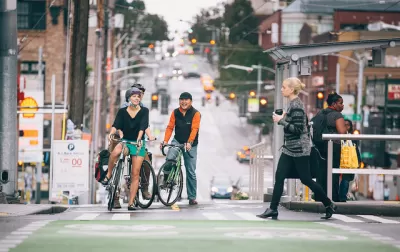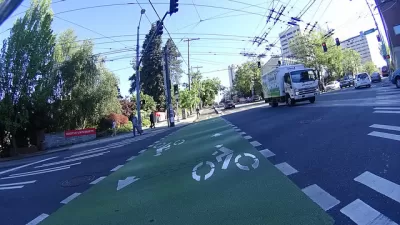The data on bike helmets have changed. Laws are starting to change too.

The Board of Health in King County, Washington voted last week "to repeal its decades-old mandatory helmet law for bicycle riders," reports David Kroman for the Seattle Times. The decision to rescind the 1993 law came after data revealed that the law was enforced selectively, disproportionately targeting people of color and people experiencing homelessness.
As explained by Kroman, in 1993, evidence suggested that mandatory helmet laws would increase helmet use and reduce the severity of injuries. Kroman provides this summary of more recent research:
But recent data connecting helmet laws to their use and improved outcomes for cyclists is less clear. In Seattle, helmet use among riders of private bikes is as high as 91%, according to one study. Meanwhile, in Portland, which does not have an all-ages helmet law, one study found use is similarly high. A study in King County could not find any discernible impact on hospitalization rates following the law’s expansion into Seattle in 2003, although severity of injuries did decrease around the same time.
A separate article by Bicycle Retailer digs into the research behind the decision, including a study by Ethan Campbell, a PhD candidate at the University of Washington. A December 2020 article by Kroman, writing for Crosscut at the time, revealed data about the use of mandatory helmet laws to cite people experiencing homelessness.
The decision to drop the county's mandatory helmet laws to disparate impacts also made the New York Times, in an article by Sophie Kasakove.
FULL STORY: King County repeals mandatory bicycle helmet law

Study: Maui’s Plan to Convert Vacation Rentals to Long-Term Housing Could Cause Nearly $1 Billion Economic Loss
The plan would reduce visitor accommodation by 25,% resulting in 1,900 jobs lost.

North Texas Transit Leaders Tout Benefits of TOD for Growing Region
At a summit focused on transit-oriented development, policymakers discussed how North Texas’ expanded light rail system can serve as a tool for economic growth.

Why Should We Subsidize Public Transportation?
Many public transit agencies face financial stress due to rising costs, declining fare revenue, and declining subsidies. Transit advocates must provide a strong business case for increasing public transit funding.

How to Make US Trains Faster
Changes to boarding platforms and a switch to electric trains could improve U.S. passenger rail service without the added cost of high-speed rail.

Columbia’s Revitalized ‘Loop’ Is a Hub for Local Entrepreneurs
A focus on small businesses is helping a commercial corridor in Columbia, Missouri thrive.

Invasive Insect Threatens Minnesota’s Ash Forests
The Emerald Ash Borer is a rapidly spreading invasive pest threatening Minnesota’s ash trees, and homeowners are encouraged to plant diverse replacement species, avoid moving ash firewood, and monitor for signs of infestation.
Urban Design for Planners 1: Software Tools
This six-course series explores essential urban design concepts using open source software and equips planners with the tools they need to participate fully in the urban design process.
Planning for Universal Design
Learn the tools for implementing Universal Design in planning regulations.
Ascent Environmental
Borough of Carlisle
Institute for Housing and Urban Development Studies (IHS)
City of Grandview
Harvard GSD Executive Education
Toledo-Lucas County Plan Commissions
Salt Lake City
NYU Wagner Graduate School of Public Service





























